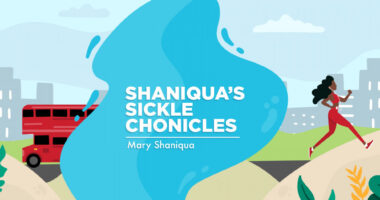My emotional journey through learning about the sickle cell ‘cure’
Casgevy's approval made me excited, but then I read the fine print

It was the evening of Nov. 17. I’d finished work and was going about my usual evening activities when my mum called to catch up. She asked if I’d heard the news of an apparent cure for sickle cell. I hadn’t, so I asked her further questions — but she’d only caught the last few moments of a television report so wasn’t 100% certain it was actually a cure, though to her it sounded like one.
I was in shock. I’ve lived with sickle cell for more than 30 years, and in that time, only a few treatments have been available. I’d learned to accept — no, I believed — that sickle cell was not a research priority. Thus, I never thought a cure would come in my lifetime.
I jumped onto Google, but couldn’t find anything about it. When I tuned on the news at 10 p.m., however, there it was, the story about CRISPR gene editing and its successful treatment of sickle cell. I’d watched numerous documentaries about CRISPR, so I understood much about the work and was amazed. In the United Kingdom, where I live, the Medicines and Healthcare products Regulatory Agency had approved the treatment as Casgevy (exagamglogene autotemcel).
Joy filled my heart. I spoke with my partner that evening to hear his views about Casgevy, and we were both hopeful and happy.
Soaring with the good news
In the days that followed, the news was everywhere. People I know were sending me news article after news article that spoke about the treatment, and it was evident everyone was excited.
Some weeks later, I saw news on Instagram that Casgevy and a cell-based therapy, Lyfgenia (lovotibeglogene autotemcel), had also been approved by the U.S. Food and Drug Administration.
To say I was ecstatic would be a huge understatement — not only because my suffering could end, but also because many people across the globe with this debilitating illness could benefit. Many of them don’t have access to the medicines and day-to-day treatment that I do. In fact, I’d recently learned of sickle cell patients in West African regions who’d died because they couldn’t afford their hospital bills — hospital bills that amounted, in British pounds, to a relatively small sum.
That’s a heartbreaking truth for many around the globe. So the thought that such people would get the chance to live easier and healthier lives excited me to my core.
Grounding myself in reality
One thing I’ve learned from living with sickle cell is that excitement can quickly turn into disappointment. It’s a life lesson that I completely forgot in the excitement of Casgevy. I usually try to avoid getting my hopes up about any possible sickle cell advance because many of those hopes have been ruined.
I came across a post by another sickle cell patient who described their lack of optimism about Casgevy. I thought, “Oh, what a Debbie Downer!” But it did prompt me to look into the matter further.
I learned first that Casgevy comes at great cost, which made me feel I’d been wrong to be excited for patients in developing nations. The chances that they’ll get access to such an expensive treatment is minimal. In fact, even those of us in developed countries will almost certainly not be able to afford it without insurance or government aid.
I also had to ground myself by accepting that the therapy would only “cure” the sickling of cells; any other complications would likely remain and require ongoing medical oversight. In essence, then, acute crisis pain could stop, but chronic pain caused by avascular necrosis, and other symptoms would remain. It’s a hard pill to swallow.
Suddenly, every incoming message about the “cure” filled me with frustration.
My mind gently reminded me of my rule against getting too excited about anything related to sickle cell. By forgetting that rule, I’d experienced an entirely different cycle of emotions about Casgevy.
I think it’s important that I find some balance here. As a natural optimist, I find it taxing to approach news with pessimism at every turn. But on the other hand, the reality is that this “cure” is limited in terms of accessibility and our health, and it won’t take away all of sickle cell’s legacy.
Perhaps it’s better that I see Casgevy, regardless of its downside, as progress — and reassurance that the research community does care about sickle cell after all. For that, I’m thankful.
What was your reaction to the news about Casgevy, especially if you heard it was a potential cure? Please tell us in the comments below.
Note: Sickle Cell Disease News is strictly a news and information website about the disease. It does not provide medical advice, diagnosis, or treatment. This content is not intended to be a substitute for professional medical advice, diagnosis, or treatment. Always seek the advice of your physician or other qualified health provider with any questions you may have regarding a medical condition. Never disregard professional medical advice or delay in seeking it because of something you have read on this website. The opinions expressed in this column are not those of Sickle Cell Disease News or its parent company, Bionews, and are intended to spark discussion about issues pertaining to sickle cell disease.








Rea Downes
I too got soo excited when I saw the news of a cure, admittedly selfishly because the agony my patients feel when in a crisis is heartbreaking to watch . When I looked more into it I was saddened by the cost and the lack of access that most regular people would have. I stopped looking into it when I saw the cost so I didn’t know that doesn’t alleviate all of SS symptoms. It seems like false advertising to me.